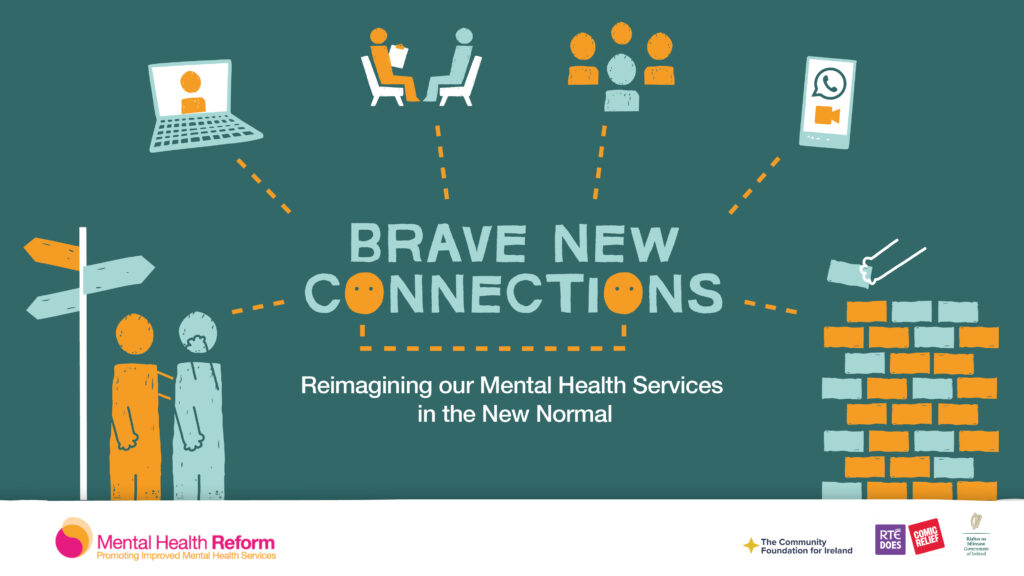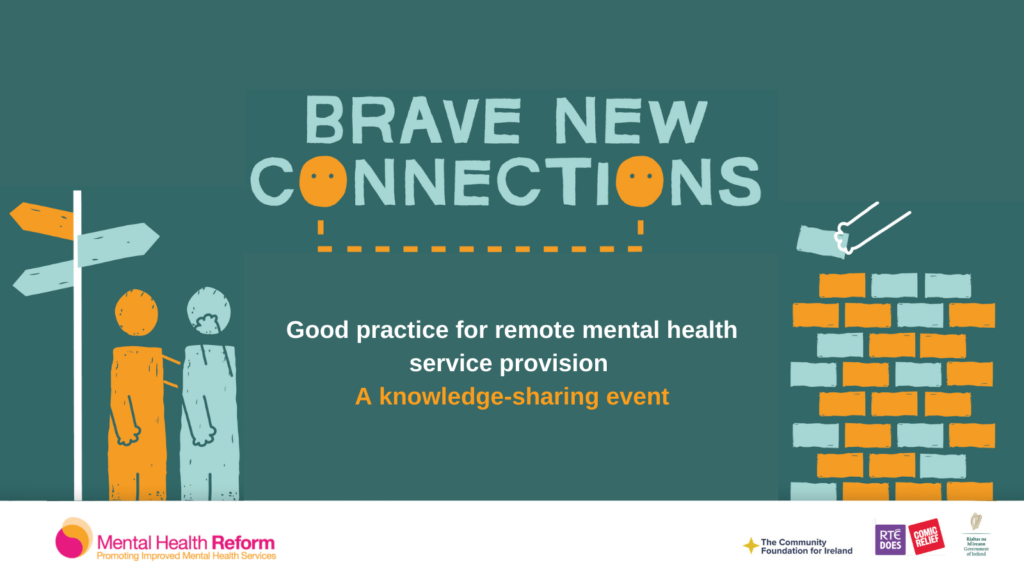
Resetting the Non-Profit Voluntary and Community Mental Health Sector After the Pandemic
‘Brave New Connections’ is a collaborative project led by Mental Health Reform (MHR) and funded by an RTE Does Comic Relief grant. The project is supporting capacity-building for non-profit organisations in the mental health field, focusing on where they have had to adapt services in response to the challenges of the COVID-19 pandemic.
In March 2022, MHR published a report titled, ‘Resetting the Non-Profit Voluntary and Community Mental Health Sector After the Pandemic’. This is the second report in the Brave New Connections series. For the first time it presents a structured profiling of the nature and volume of the services and supports provided by the non-profit mental healthcare sector. This provides new insights, evidence, and perspectives that can inform current efforts to develop the Irish mental healthcare system and achieve the policy objectives of Sharing the Vision, Connecting for Life, Healthy Ireland, and Sláintecare.
Coming out of the pandemic in 2022 presents a unique historical opportunity to support the re-set of the sector in ways that align with the goals of key policy frameworks.

Survey of adaptations by non-profit mental health organisations during the pandemic

Good practice for remote mental health service provision
A knowledge-sharing event
As part of the Brave New Connection’s (BNC) project, MHR hosted an online event ‘Good practice for remote mental health service provision – A knowledge-sharing event’ on Thursday 27th January 2022. The event focused on experiences of Voluntary and Community Sector (VCS) organisations in implementing online/digital mental health services and supports – one of the biggest impacts of the pandemic for the sector.
Event Overview
Fiona Coyle (CEO, MHR), Frances Haworth (Community Foundation for Ireland) and Dominika Topolska (MHR) introduced the Brave New Connections project and outlined the agenda for the day.
In the opening session, Kevin Cullen (Scientific Advisor, MHR) presented research on the mental health activities of the organisations in the VCS mental health sector. The presentation included a mapping of the range, nature and volume of the activities offered by the sector. A forthcoming report from Brave New Connections will present this in more detail and how it can inform further development of the role and contribution of the VCS in line with Sharing the Vision.
In the first ‘Digital Mental Health in Action’ panel session, organisations shared their experience of online/remote service provision using different channels (text, video, phone, chat). Lochlann Scott (Helplink Mental Health) spoke about the extensive expansion of their online mental health services and supports, including video counselling sessions with a broad range of user groups. Ross Flanagan (SpunOut) spoke about the text-based Youth Information Chat service, and how it works for young people getting in contact about mental health issues. Ciaran Moore (Samaritans) spoke about the sophisticated phone systems utilized in the Samaritans to provide their phone-based support service, as well as how they have developed debriefing and peer support for volunteers working alone. Paul Longmore (Jigsaw) spoke about Jigsaw online, a text-based service environment implemented through live chat, group chat, email and multimedia content.
The next session concerned best practice guidelines for online service provision. Iwona Blasi from the Irish Association for Counselling and Psychotherapy (IACP) talked through the IACP’s response to the pandemic and the work they are doing to review/update their guidelines for online counselling/psychotherapy. The BNC project is supporting IACP in this guidance development work. Kevin Cullen (MHR) outlined some of the ways the project will contribute, including development of guidance on what to consider when choosing video platforms for mental health service provision.
A second ‘Digital Mental Health in Action’ panel session followed. Dominic Layden (Aware) spoke about the experiences of Aware in establishing online services, including data management issues around registration processes for service users. Kathy Downes (Bodywhys) spoke about developments and experiences in Bodywhys, including online support groups and the online CBT-based psychoeducation programme (SeeMySelf). Marta Jaworska (MyMind) spoke about programmes that MyMind have implemented to provide video counselling for specific target groups during the pandemic, as well as how they are using innovations such as chat bots to support user access. Michele Kerrigan (Grow) spoke about a range of their support services that moved online during the pandemic and how they are now building on their experiences to develop a mix of face-to-face and online options going forward. Shane Kirwan (St. Patrick’s Mental Health Services) spoke about an innovative home care service developed during the pandemic, using one-to-one video communication and a range of other supports to enable people to be supported at home who would otherwise have been admitted to the hospital as in-patients.
Next steps – pilot of BNC ‘clearinghouse’ and knowledge sharing channel
Previous work in the BNC project has indicated considerable interest in greater knowledge sharing across the sector, particularly around the delivery of online mental health services. The event on January 27th was a useful first step in addressing this. As a follow-on, the project is now piloting a ‘clearinghouse’ whereby queries and questions about online/remote mental health services offered by the sector can be directed to a dedicated contact point – bnc@mentalhealthreform.ie.
The project will endeavour to respond with relevant information or will try to connect you with other relevant persons/organisations. It is hoped that this new channel will help to foster greater knowledge sharing, interworking and collaboration across the sector. The project will also be delivering additional capacity-building activities over the coming months, including publication of a second BNC report. Keep an eye on the MHR website and social media channels for updates.

